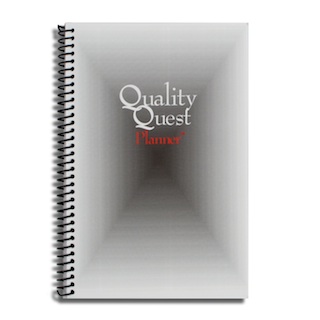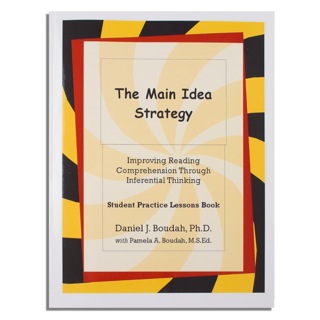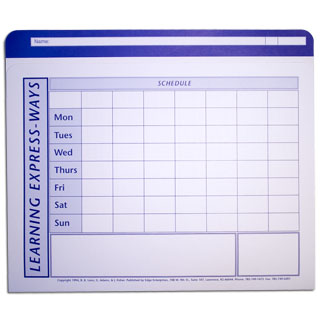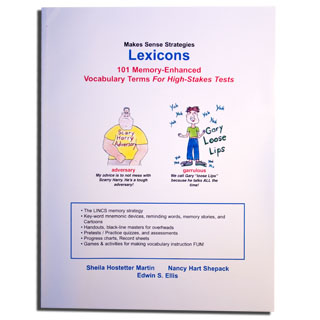Description
Research on the Quality Quest Planner and the Assignment Completion Strategy
Overview
This study investigated the effects of teaching the Assignment Completion Strategy to students with learning disabilities who were enrolled in at least three general education courses in which homework was assigned. Students used sheets like those in the Quality Quest Planner to record their assignments as they used the strategy. Nine students in the 6th through 8th grades participated. One repeated measure in the study was the percentage of assignment completion behaviors performed by the students on a series of simulated probe assignments in the resource room where instruction in the strategy took place. Another repeated measure was the percentage of assignment completion behaviors performed by the students on actual assignments given to them in their general education classes as determined from each student’s recordings in his/her assignment notebook. In addition, the teachers in these general education classes supplied information about the assignments given each week as well as whether each assignment was turned in, whether it was turned in on time, and the student’s quarterly grade. A multiple-probe across-students design was used.
Results
Results gathered before instruction showed that the students earned an average of 19% of the points available for assignment completion behaviors on simulated assignments. During instruction in the Assignment Completion Strategy, eight of the nine students earned an average of 81% of the points available for simulated assignments, and they met the mastery criterion of 90% of the points within 3 practice trials. During the maintenance condition, the students earned an average of 90% of the points on simulated assignments.
On actual assignments given in class, the students earned an average of less than 1.7% of the points available for recording assignments and planning assignment completion per week. During the instructional and maintenance conditions, they earned an average of 28% and 60% of the points, respectively.
With regard to actual assignment completion, students turned in an average of 54% of their assignments during baseline and an average of 58% of their assignments during instruction in the strategy. During the maintenance condition, they turned in 70% of their assignments. They earned a grade-point average of 1.7 in the targeted classes in the first school quarter before instruction in the strategy. During the fourth school quarter, which occurred after the assignment-completion instruction, they earned a grade-point average of 2.7 in those classes.
Conclusions
This study showed that students with LD who were completing about half of their assignments in their general education classes could learn a strategy comprised of key behaviors associated with completing assignments including recording their assignments in an organized way. In addition, after learning the strategy, their assignment completion rates and grade-point average in the targeted general education classes improved.
Reference
Hughes, C. A., Ruhl, K. L., Schumaker, J. B., & Deshler, D. D. (2002). Effects of instruction in an assignment completion strategy on the homework performance of students with learning disabilities in general education classes. Learning Disabilities Research & Practice, 17(1), 1-18.
About the Author

Charles Hughes, Ph.D.
Affliations
Professor of Special Education
Penn State University
Research Affiliate and Certified SIM Professional Development Specialist
University of Kansas Center for Research on Learning
My Background and Interests
I was a classroom teacher for six years, primarily with students with learning and behavior problems at the middle- and senior-high levels. I also spent four years as a state-level consultant to programs for students with emotional and behavior disorders. After that, I was an educational diagnostician and mainstream consulting teacher for a university-based multidisciplinary diagnostic and training program. For the last 23 years, I have been a university professor and have taught and conducted research in the area of learning disabilities. I have co-authored a number of the learning strategies instructor’s manuals within the Learning Strategies Curriculum, and I have worked with the University of Kansas Center for Research on Learning (KU-CRL) for over 20 years. As a SIM professional development specialist, I have conducted over 100 workshops in more than 20 states and have made presentations and conducted training sessions in Jamaica, South Korea, Russia, Saudi Arabia, India, and Sweden.
The Story Behind the Assignment Completion Package
Many students have difficulty with completing homework assignments, beginning with recording assignments accurately and completely, as well as developing a plan for how and when they will complete their assignments. My colleagues and I wanted to develop a strategy to help students complete these tasks as well as think about the quality of their homework products. As we worked on the strategy, we realized that we would need to develop a number of forms as part of this package. The forms eventually evolved to include a monthly planner to keep track of long-range assignments as well as other events or activities that would interact with their planning of schedules for completing the assignments. Additionally, since planning when to do homework is so critical, we included a weekly planner so that students could plan when they could and could not do homework. Finally, we included a form for recording and analyzing assignments. All these forms that are so critical to recording and planning homework have been compiled in an assignment notebook entitled The Quality Quest Planner.
I conducted the field-test for this strategy at a middle school where I worked while I took a sabbatical from Penn State (which reminded me what a tough job teaching really is!). The study was very successful, and all of the students began to complete more homework and earned better grades. However, I was struck by the fact that while they all did more homework (they doubled their production), they were still not completing all of their assignments. When asked why, the most frequent response was, “I did not know how to do it.” Clearly, this organizational strategy was helping them quite a bit, but their reports pointed out the fact that students often are asked to do things that they don’t know how to do!
My Thoughts about Strategic Instruction
Based on my 25 years of work in the area of strategic instruction, I view this type of instruction as a key approach to the overall education of students with learning disabilities and other students who have difficulty learning. As a teacher, researcher, and parent, I have seen how much strategic instruction benefits students. Students not only learn these strategies and as a result perform better on school-related tasks, there is an overall benefit: they begin to see themselves as successful and competent learners. Another general benefit that I observe is that strategic instruction gives students a way of starting tasks and working their way through them. I often observed students just sitting at their desks looking at the assignment, test, or reading selection not knowing how or where to begin. Strategies are a concrete way of getting started and systematically solving problems and completing tasks. Not a small accomplishment!
My Contact Information
data issue dc








